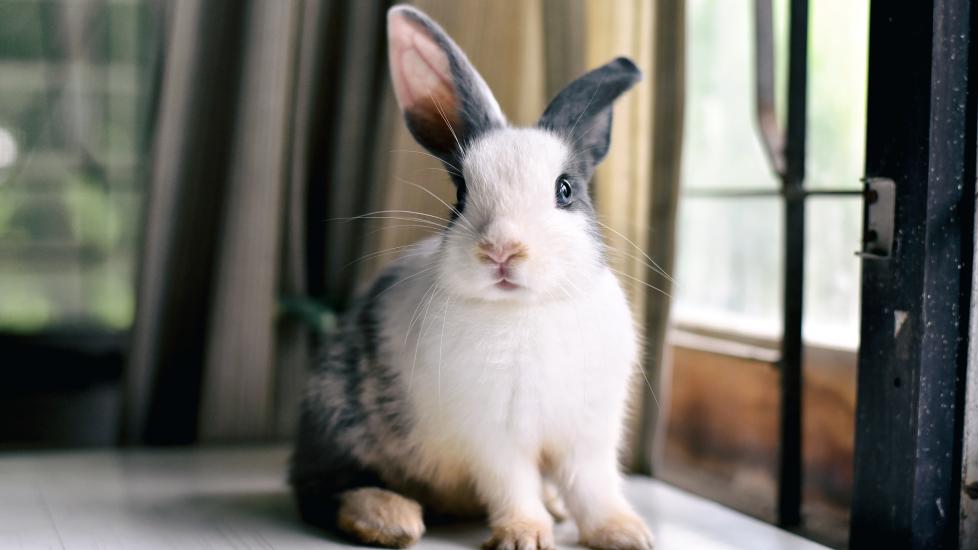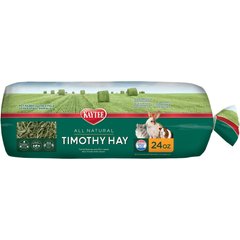Rabbit UTI (Urinary Tract Infection)
What Is a Rabbit UTI?
A rabbit UTI, or rabbit urinary tract infection, is a bacterial infection in the urinary tract that can cause significant pain in rabbits.
A rabbit’s urine contains high levels of calcium. Calcium build-up in the urinary tract can predispose rabbits to more UTIs than other mammals.
UTIs that receive timely treatment are typically not serious. An untreated UTI can cause long-term or even permanent damage to the bladder, so it’s important to always seek treatment as soon as symptoms are noted.
Symptoms of a Rabbit UTI
-
Urinary incontinence (unable to control urination)
-
Dribbling urine or straining to urinate
-
Urinating outside of the litter box or normal areas
-
Lethargy
-
Inappetence
-
Urine scalding of the skin (baldness and red, irritated skin near the genital area)
-
Excessive licking of genital region
-
Rabbit consistently hunched, often in an uncomfortable posture
-
Teeth grinding
-
Hiding
-
Reactivity to having abdomen touched
-
Darker than usual urine
Causes of a Rabbit UTI
There are various underlying causes that can trigger a UTI in a rabbit.
Excessive Dietary Calcium
Rabbits need unlimited amounts of timothy or grass hay in their diet. While most hay is suitable for rabbits, alfalfa hay should only be fed to adult rabbits in moderation.
Alfalfa has significantly higher calcium levels than other grass hays that your rabbit would eat. While some calcium is expected in a rabbit’s urine, if they have access to too much alfalfa—either as loose hay or as formed cubes, pellets, or treats—the higher concentrations of calcium solids in a rabbit’s urine can irritate the lining of their urinary tract, which allow bacteria to invade and cause a UTI.
Chronic Dehydration
A dehydrated a rabbit will have more concentrated urine. Most animals do not have crystals in their urine. However, it is normal for rabbits to have calcium-based crystals and even small stones in their urine. It is critical that a rabbit drinks enough water to stay hydrated because this is how they flush these urinary solids.
Rabbits drink best from water bowls rather than hanging bottles and lack of a water bowl can predispose a rabbit to chronic dehydration.
Obesity
Obese or overweight rabbits are prone to trapping more moisture (humidity) around their genitals. A less mobile bunny may also be less hydrated.
A humid environment is a breeding ground for bacteria and less hydration means more concentrated urine, which can cause inflammation of the urethra that triggers an infection.
Back Injuries
A rabbit with a back injury may not be able to fully empty their bladder. When urine sits in the urinary tract for extended periods of time, bacteria can breed and a UTI can develop.
The stress of a back injury can also cause immunosuppression, making rabbits that much more susceptible to an infection.
Soiled Bedding
Areas contaminated by urine and feces that stay damp will grow significant amounts of bacteria. When a rabbit comes in contact with these areas, such as using the litter box or laying on soiled bedding, they are being exposed to bacteria that can cause a UTI.
Calcium Supplements
The average rabbit does not need calcium supplements, but those that are pregnant or lactating, or have a medical condition, may be recommended various forms of calcium supplements by a veterinarian.
If a rabbit is receiving unnecessary extra calcium, this increases the amount of calcium in their urine as well, which can cause irritation and blockages that cause UTIs in rabbits.
Anatomical Urinary Tract Abnormalities
Though rare, a rabbit can be born with an abnormality in their urinary tract, known as a congenital condition, which can predispose them to UTIs. Examples of urinary tract abnormalities include:
-
Abnormal strictures, deviations, or pockets along their urinary tract
-
Malformed kidneys
-
Ureters
-
Abnormal bladder or urethral walls
Bladder Stones
A bladder stone is an combination of urinary crystals. These will cause trauma to the bladder wall once formed and can cause a urinary blockage if they get stuck within a rabbit’s urethra. The constant trauma caused by bladder stones can predispose a rabbit to developing a UTI.
Urinary Obstructions
Urinary obstructions are an emergency condition that pose a significant health risk to your rabbit.
Inflammation in the urethra, potentially paired with excessive urinary calcium and/or stones, can lead to an obstruction of the urethra, which means no urine can make it out of the bladder and out of the rabbit.
A rabbit’s body has no way to tell the body to stop making urine if it can’t exit, so the urine accumulates in the bladder, potentially to the point of rupture. The stagnant urine in the bladder is a breeding ground for bacteria, as can be any traumatized tissue at the location of the obstruction.
Potentially permanent damage can be done to the bladder wall due to extreme and protracted stretching. This keeps the bladder from being able to properly empty in the future and can leave a rabbit susceptible to UTIs for the rest of their life.
How Veterinarians Diagnose a Rabbit UTI
A veterinarian will combine a thorough history—which checks for sources of excess dietary calcium—with relevant symptoms and urine screening tests to diagnose a UTI in rabbits. Additionally, they will conduct a physical exam to determine if any injuries or obvious signs are causing your rabbit’s UTI.
Be prepared to answer questions about your rabbit’s care in detail at a veterinary appointment, including exact amounts and brands of all food, hay, treats, supplements, and bedding provided to your rabbit.
Your veterinarian can perform a urinalysis, which helps to identify not just bacteria in the urine, but also other abnormalities in the urine that can increase the risk of a UTI.
Urine culture and sensitivity testing can also be performed on a urine sample, which will grow any bacteria that is present and screen which antibiotics will and will not treat a UTI infection in a rabbit.
If necessary, X-rays or other imaging tests can check the abdomen for some related causes or issues such as bladder stones. This can also help diagnose related issues such as back injuries.
Treatment of a Rabbit UTI
Rabbit UTIs typically require two steps for treatment.
The first is starting your rabbit on an antibiotic, which treats the actual bacterial infection. The choice of antibiotic can be made through a urine culture and sensitivity testing.
Medications your vet may recommend to treat a rabbit UTI include:
-
Trimethoprim sulfa
-
Enrofloxacin
The second step to treat a rabbit UTI is to address the underlying problem, which is usually excess calcium in the urine stemming from excess calcium in the rabbit's diet. This means replacing any alfalfa hay with hays that have lower calcium concentrations, such as timothy hay. Alfalfa pellets will also usually be removed from their diet.
In severe cases that have caused lasting damage to the bladder or urinary tract, surgery or flushing of the urinary tract may be necessary.
While most UTIs in rabbits can be treated quickly and easily, UTIs that are left untreated can have a guarded prognosis. Related issues, such as a urinary obstruction from the same calcium sediment in the urine that can cause a UTI, can kill a rabbit in about a day or less if left untreated.
It’s critical to always seek timely treatment for urinary symptoms in your rabbit.
Recovery and Management of a Rabbit UTI
With an uncomplicated UTI, rabbits are given antibiotics daily for two to four weeks. Any rabbit taking antibiotics needs to be monitored carefully for signs of GI stasis, which is a medical emergency. GI stasis occurs when a rabbit’s intestinal tract stops moving, and rabbits are unable to pass stool and are at risk for impactions.
With more severe UTIs, time in the hospital with a urinary catheter to assist with urination may be needed, along with several months of medication to help the rabbit continue to urinate appropriately while their bladder heals.
If urine scald is present, the area must be kept clean and dry. This also means making sure their enclosure, bedding, and litter box are always completely clean.
When changing hay and diet for a rabbit to lower calcium options, make sure they are adapting to and eating their new diet. Ask your veterinarian for help if your bunny is refusing the better alternatives.
Provide plenty of water and encourage extra drinking. Better hydration keeps a rabbit’s urinary tract much more comfortable by easing irritation. Always provide your rabbit water in a bowl, not just in a bottle.
If your rabbit isn’t responding to treatment, contact your vet. Untreated UTIs can cause bladder tension to fail due to chronic inflammation and irritation, leaving it unable to fully empty and triggering chronic UTIs in a rabbit.
Prevention of a Rabbit UTI
The best way to prevent a UTI in rabbits is to offer alfalfa in small, limited quantities, and to remove it entirely from the diet of rabbits that have had UTIs in the past. Your veterinarian can help you determine the best diet and recommended amounts of alfalfa, based on your rabbit’s history and health.
Rabbit UTI FAQs
How do you know if your rabbit has a UTI?
Contact your veterinarian if your rabbit is struggling to urinate, dribbling urine, seems lethargic, is eating less, or appears uncomfortable. These are all signs of a rabbit UTI and a veterinarian will be able to make a definitive diagnosis.
What can I give my rabbit for a UTI?
Since UTIs are caused by bacteria, the best option for a rabbit with a UTI is an appropriate antibiotic, which can be prescribed by your veterinarian.
What are the symptoms of urine scald in rabbits?
Urine scalded rabbit skin may appear red, inflamed, moist, has hair loss, is warm and painful to the touch, and may have a foul odor.
What causes red pee in rabbits?
Blood in the urine is what makes rabbit pee appear red. Small amounts of red coloring can be secondary to a normal amount of irritation from calcium sediment in rabbit urine, and this usually just gives the urine a deeper yellow to brown color. Entirely red pee indicates a more severe issue, such as a UTI.
Featured Image: Artfully79/iStock via Getty Images Plus
References
Antinoff N. Urinary Disease in Ferrets, Rabbits and Rodents. Pacific Veterinary Conference. 2019.
Reavill DR, Lennox AM. Disease Overview of the Urinary Tract in Exotic Companion Mammals and Tips on Clinical Management. Veterinary Clinics of North America: Exotic Animal Practice. 2020.
Brooks EE. Urolithiasis, Lower Urinary Tract in Rabbits (Exotic Pets). Veterinary Information Network. 2021.


